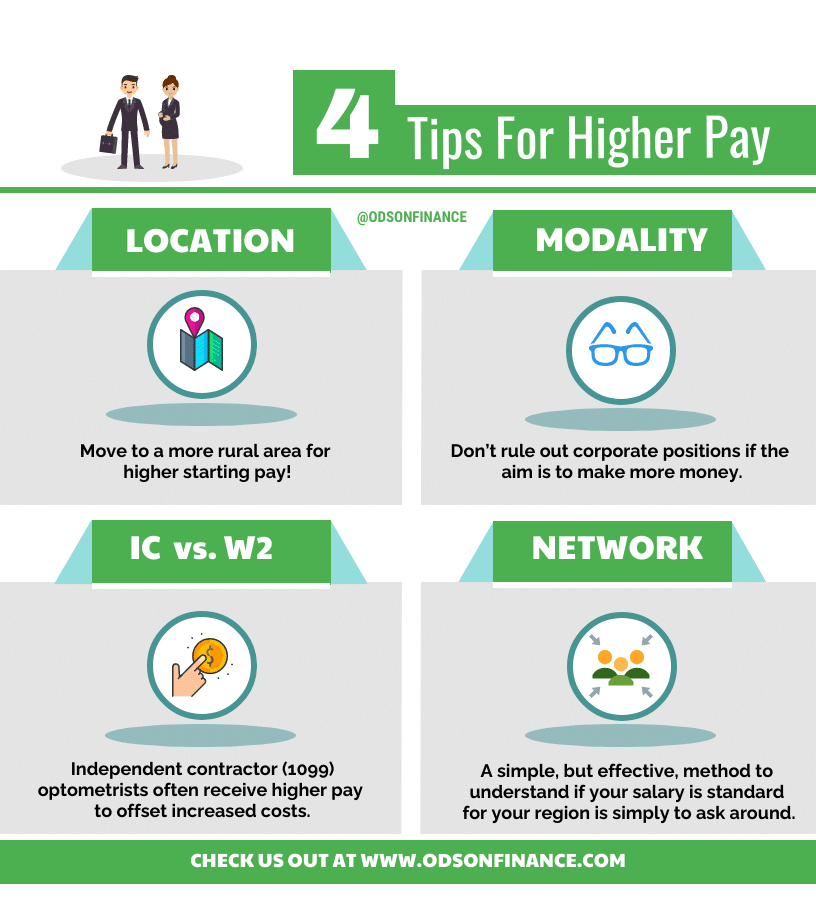Optometry Job Compensation: Are You Underpaid?

KEY POINTS:
-
(1) Move to a more rural area for higher starting pay!
-
(2) Don’t rule out corporate positions if the aim is to make more money
-
(3) Independent contractor (1099) optometrists often receive higher pay to offset increased costs.
-
(4) To learn more about what the local going rate is, simply ask your fellow OD colleagues and local industry reps
If you follow the ODs on Finance Facebook page, among the great content you may find some disputable topics. Perhaps one of the more controversial issues that plenty of optometrists deal with regularly is compensation. Specifically, many ODs wonder where their financial package falls on the scale of monetary standards, from “You’re Getting Ripped Off” to “I’ll Have My Student Loans Paid Off and Own a Lamborghini In No Time.”
One of the problems with this, of course, is that the answers are no less muddled than the question at hand. I will begin and end this brief article that answers whether or not a compensation package is fair to an employed optometrist with the ever-so-frustrating and unsatisfactory response of “it depends.” Let’s dive a little deeper and shed some light as to how employed ODs can analyze their compensation packages.
(1) Location Dependent
One of the most important factors to consider when evaluating salary in an employee contract is the location of the position. Although it is a generalization, it is common knowledge in optometry that ODs in rural areas are often offered higher pay than in urban areas. A simple explanation can be found in the law of supply and demand.
Rural areas are less saturated with optometrists, therefore employers have a smaller applicant pool to select from and offer higher wages to entice job candidates. On the other hand, in urban areas, optometrists are a dime a dozen and employers offer lower salaries as there is no shortage of job seekers.
With this in mind, leverage in contract negotiations tends to favor employers in urban areas and job seekers in rural areas, generally speaking.
Key Takeaway
- Move to a more rural area for higher starting pay!
(2) Practice Modality
There is no shortage of open optometrist employment positions if you know where to look. With the rise of corporate/retail optometry, it is no surprise that a large number of openings are within a retail setting. I will not discuss whether corporate optometry is “good” or “bad” for our profession, but it is worth mentioning that most optometrist openings in this modality offer high salaries with good benefits. Commonly, these compensation packages supersede those presented by private optometry practices. Therefore, as long as corporate chains continue to provide favorable employment contracts to ODs, private practices may need to improve their job offers in hopes of hiring the best optometrist candidates in the job market.
Of course, there are exceptions. Some positions in ophthalmology offices can pay well. Plenty of private optometry practices are willing to offer high salaries and these opportunities do exist (both of my last job offers included ridiculously high compensation), but it begs to reason that one of the forces driving new grads to corporate optometry is better wages.
Less popular optometry settings include VA hospitals, military, and academia. Usually the starting salaries with these modalities are on the low end of the spectrum (but the benefits can be tremendous).
Key Takeaway
- Don’t rule out corporate positions if the aim is to make MORE MONEY
(3) Independent Contractor Vs. Employee
No legal advice is being offered, but according to the IRS guidelines: most optometrists should likely fall under the category of employee and not independent contractor (IC). With that in mind, the benefits to an employer of hiring an OD as an IC is that the employer saves money on employment taxes. However, the government is going to get that money elsewhere and that responsibility lands on the Independent Contractor. Because an IC must pay more in taxes, it is common for IC optometrists to demand higher wages to offset their extra costs.
Hence, an IC optometrist who gets paid per diem may consider asking for a higher daily rate. If wages are tied to production, an IC OD may contemplate negotiating for a higher percentage of revenue.
Key Takeaway
- Independent contractor (1099) optometrists often receive higher pay to offset increased costs.
(4) Additional Tips
A simple, but effective, method to understand if your salary is standard for your region is simply to ask around. Ask friends in the area and inquire about their pay. Unfortunately, income is still a taboo topic for most people, but if your friends are uncomfortable discussing finances then consider getting other friends!
Searching other job openings in the area can shine some light on market salaries. Additionally, many industry reps tend to be quite knowledgeable about a variety of eye care topics, market rates included. Consider picking the brains of a few contact lens reps and asking if they know more about standard compensation for the area.
Key Takeaway
- To learn more about what the local going rate is, simply ask your fellow OD colleagues and local industry reps
Closing Thoughts/Summary
By no means is this article a comprehensive guide to analyzing optometrist compensation. However, I do hope it gives a few ideas to consider when examining salaries. Furthermore, it is crucially important to realize that salary ≠ compensation package. The former focuses solely on pay received on a consistent basis for work done; while the latter encompasses job pay plus a broader range of benefits (medical insurance, paid time off, retirement accounts, etc.). Here are things to look for in a contract. Some ODs may be willing to accept an offer with a lower starting salary if he/she could get better health benefits or more paid leave, etc.
In other words, look at the entire picture when deciding whether or not your pay is “fair.” So, do you still have questions regarding your job salary? If you were to ask me whether or not I think your compensation is appropriate, I’ll answer the same way I started this article - “it depends.”
Need some guidance on your Contract Review? Schedule a one-on-one Consult Online
Want to learn how to find the perfect OD career such as how to negotiate your pay? Read more at Finding the Right Optometric Path
Related Articles
- « Previous
- 1
- 2
- 3


Facebook Comments